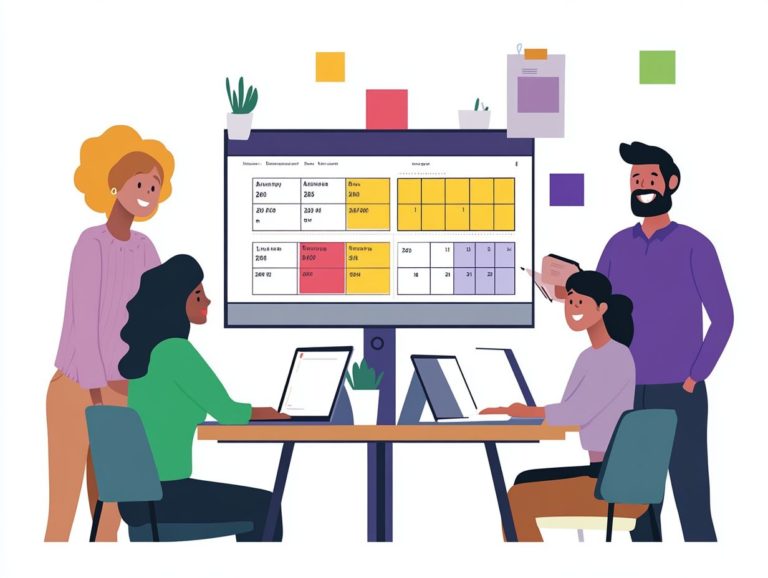What Features Should CRM Software Have?
In today s fast-paced business landscape, managing customer relationships effectively is critical. Don t miss out on the chance to transform your business with effective CRM tools!
CRM software can be a game-changer, streamlining your interactions with clients. It enhances your sales, marketing, and customer support efforts.
This article delves into key features that every CRM should offer, such as customer data management, automation tools, and robust analytics. You ll also learn important considerations to keep in mind when selecting the perfect CRM solution tailored to your unique business needs.
Whether you re a small startup or an established enterprise, grasping these aspects will empower you to make informed decisions that drive growth and strengthen your customer relationships.
Key Takeaways:

Effectively manage customer data with CRM software to track interactions, preferences, and buying behavior.
Automate sales and marketing processes to improve efficiency and drive revenue growth.
Improve customer service and support by utilizing CRM features such as case management and self-service portals.
What is CRM Software?
Customer Relationship Management (CRM) software is essential for managing and analyzing every interaction along the customer journey.
By consolidating customer data, these systems streamline processes, improve relationships, and elevate sales performance.
With robust functionalities, effective contact management becomes effortless. You can organize and track each engagement with your clients.
Sales pipeline management allows you to visualize your sales processes, helping you spot potential bottlenecks and refine your strategies.
Tools like Salesforce and HubSpot give you crucial insights about your customers. Automated data capture keeps your information up-to-date without manual entry, while seamless integration with other tools enhances operational efficiency.
Key Features of CRM Software
CRM software offers a wealth of essential features tailored to elevate productivity and refine customer interactions.
In today s competitive landscape, this powerful tool is critical for any modern business striving for excellence.
Customer Data Management
Customer Data Management is a core feature of CRM software that enables you to store and analyze valuable client information.
This approach enhances the customer experience and supports knowledge-based decision-making.
With advanced interaction tracking, you can easily monitor every touchpoint with clients, paving the way for more personalized service.
This comprehensive approach ensures that all relevant data is readily accessible to your sales and support teams, helping them build stronger customer relationships.
The importance of data retention is paramount, as it protects historical insights that can shape future strategies. Enhanced security features guard sensitive information against breaches, while automated data capture streamlines processes for accuracy and efficiency.
Sales and Marketing Automation
Sales and Marketing Automation simplifies essential processes like lead management and campaign oversight.
By automating various marketing tasks, your CRM enables your team to coordinate efforts seamlessly, significantly reducing manual labor.
Enhanced lead scoring capabilities prioritize prospects based on engagement and potential value, helping your sales team allocate their time wisely.
Integrating tools like Mailchimp and Google Analytics provides actionable sales analytics that enhance your ability to track performance and optimize your sales funnel.
This approach boosts conversion rates and cultivates stronger customer relationships over time.
Explore CRM options today to give your business the competitive edge it needs!
In summary, understanding and choosing the right CRM is crucial for your specific needs. It can significantly impact your business success.
Customer Service and Support

The Customer Service and Support features of CRM software are carefully designed to elevate your customer satisfaction levels. They provide you with essential tools to manage client interactions effectively and efficiently.
By leveraging support automation tools that help automate responses to customer inquiries, you can streamline your processes. This ensures that customer inquiries receive timely responses. Chat integration is crucial here, enabling real-time communication and allowing you to offer immediate assistance something your customers increasingly expect in today s fast-paced environment.
Email client integration further enriches this dynamic by centralizing communications. This significantly reduces the chances of missed messages and cultivates a cohesive approach to your customer interactions.
Together, these productivity and communication tools enable your teams to deliver a seamless experience. This ultimately drives loyalty and growth while minimizing operational bottlenecks.
Analytics and Reporting
The Analytics and Reporting features in CRM software enable you to extract actionable insights from customer data. This enhances your sales performance and refines your marketing strategies.
These tools facilitate sophisticated sales forecasting, allowing you to predict future revenue trends by analyzing historical data, seasonal patterns, and customer behavior.
By systematically tracking key performance metrics, the software transforms raw data into clear, comprehensible reports. These reports guide you in making informed decisions.
This analytical capability reveals strengths and weaknesses in your sales tactics and uncovers valuable opportunities for growth.
Ultimately, leveraging these insights can provide you with a significant competitive advantage. This enables you to adapt swiftly to market changes and optimize your overall sales approach.
Integration with Other Tools
Integration with other tools is a pivotal feature of CRM software that enhances its functionality. By connecting with various platforms, you ensure seamless data flow and improve your operational efficiency.
By leveraging third-party integrations, you can harness the power of advanced social media management tools, streamline your efforts with marketing automation platforms like Marketo, and obtain actionable insights through robust analytics software such as Google Analytics.
This interconnected approach facilitates workflow automation and offers customizable options tailored to your unique business needs.
This strategy helps your organization enhance marketing strategies, refine customer engagement, and make data-driven decisions that drive growth and success in an increasingly competitive landscape.
Considerations When Choosing CRM Software
When selecting CRM software, take the time to evaluate several key factors, including your unique business needs, budget constraints, scalability options, and the vendor’s reputation.
This thoughtful approach will help you make a well-informed choice that aligns with your goals and enhances your operations.
Business Needs and Budget
Evaluating your specific business needs and budget is essential when selecting CRM software. This ensures that the solution you choose aligns perfectly with your operational goals and financial limitations.
For small businesses, this process becomes even more crucial due to limited resources and the unique challenges they face.
Various CRM options cater to different business sizes, offering customized features that can enhance customer interactions and improve sales performance.
Small businesses often benefit from straightforward tools that simplify communication and track customer engagements without unnecessary complexities.
A CRM that seamlessly integrates with your existing processes can be a game-changer, allowing you to manage your limited resources effectively while driving growth through better insights and performance metrics.
Scalability and Customization

Scalability and customization are essential features to consider when choosing Customer Relationship Management (CRM) software, as they determine the system’s ability to grow with your business and adapt to your evolving needs.
For businesses looking to streamline their sales funnel, a scalable CRM allows you to manage increasing customer interactions and data efficiently. This ensures peak performance is maintained.
Customization options enable you to tailor workflows that align perfectly with your territory management strategies, catering to the unique demands of your market.
By adopting a system that evolves alongside your objectives, you enhance the user experience. This approach ensures that each team member operates within a framework that supports their roles and maximizes productivity.
This adaptability promotes growth act now to ensure your team is equipped for success.
User-Friendliness and Training
User-friendliness and training are critical factors to consider when selecting CRM software. An intuitive interface can greatly enhance your user adoption.
A CRM designed for your experience minimizes the learning curve for new users, enabling you to utilize its task management features effectively.
This seamless navigation allows all team members, regardless of their level of tech-savviness, to access essential communication tools without a hitch.
Implementing effective training programs is essential. They equip you with the knowledge and skills necessary to fully leverage the CRM’s capabilities, boosting collaboration and workflow efficiency.
By prioritizing these elements, your organization can unlock the full potential of its CRM system, leading to better engagement.
Vendor Reputation and Support
The reputation of your CRM vendor and the quality of their support are critical factors influencing the success of your CRM implementation. This also affects ongoing usage, ultimately impacting customer satisfaction and security.
When evaluating a vendor’s reputation, it s essential to dive into customer reviews. This provides valuable insights into real-world experiences, especially regarding reported security features and data retention policies.
Analyzing this feedback helps you spot patterns in software reliability and customer support responsiveness. You can assess whether the vendor takes a proactive approach to resolving issues.
Consider the various support options available from live chat to comprehensive self-service resources. This ensures help is easily accessible when needed.
Ultimately, conducting a thorough assessment of these factors ensures that you choose a trustworthy partner while effectively safeguarding your sensitive data.
Frequently Asked Questions
Key Features of CRM Software
CRM software should have features that help businesses manage customer relationships, track customer interactions, and improve customer satisfaction. For a deeper understanding, check out what to look for in a CRM.
Must-Have Features for CRM Software

Some must-have features for CRM software include contact management, sales tracking, lead management, marketing automation, and customer service management.
Can CRM Software Be Customized for Specific Business Needs?
Yes, most CRM software offers customizable features that can be tailored to meet specific business needs, such as industry-specific workflows and integrations.
What Role Does Data Management Play in CRM Software Features?
Data management is a crucial feature in CRM software as it allows businesses to organize, store, and manage customer data effectively. This data can then be used for targeted marketing, sales forecasting, and customer service.
Are There Collaboration Features in CRM Software?
Yes, many CRM software options offer collaboration features such as team communication, task assignment, and project management. These features help improve team efficiency and productivity.
Can CRM software integrate with other business tools?
Yes! Most CRM software integrates with various business tools. This includes email marketing software, social media platforms, and accounting software.
This makes sharing information easy and keeps your operations running smoothly. Experience the power of connectivity!






